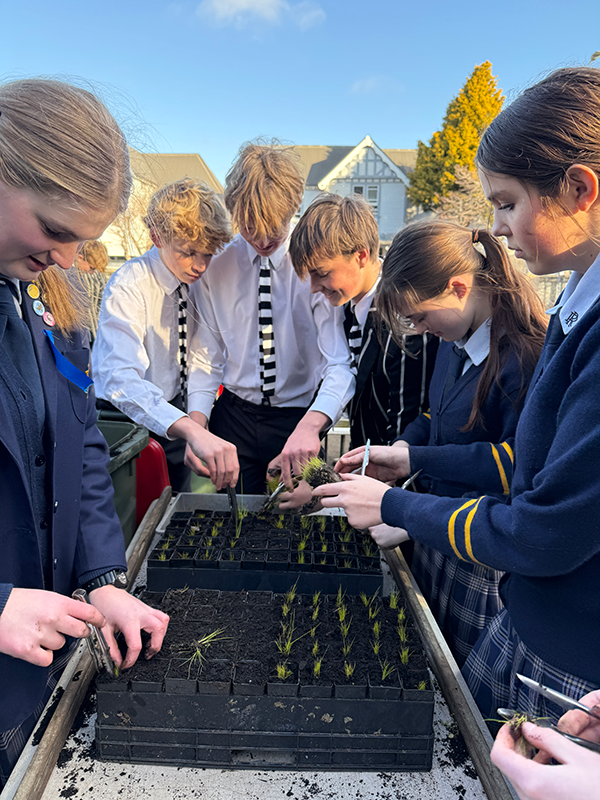
Eco Action Nursery Trust donates 26 000 native plants to WIL shareholders

Students from Rangi Ruru Girls’ School and Christ’s College work together to prick out native seedlings at one of Eco Action Nursery Trust’s satellite located nurseries at Christ’s College. The nursery grows over 28 species of native plants. From left: Emelia Handyside, Hugo Bush, Harrison Tapper, Gabe Botherway, Sophia Wood and Gemma Speizer.
WIL shareholders recently received 26 000 native plants for on-farm biodiversity improvement projects thanks to a generous donation from Eco Action Nursery Trust.
Eco Action Nursery Trust was established in 2016 as a charitable trust with the aim of planting native forest corridors in red-zoned areas of Christchurch, including the QEII Nature Trail. The overarching vision for the environmental group is to create a “green space” of native planting. Native trees and plants are carefully chosen to provide a food source that will allow birdlife to thrive in the native forests being created by the Trust.
Since 2016, students from 28 Canterbury schools, three community groups and two retirement villages have devoted hundreds of hours to pot up and plant native seedlings which are eco-sourced. Each of the satellite nurseries received a free start up kit which included 500 to 5,000 native seedlings along with potting mix, pots, weed mats and irrigation systems.
In its first year, the Trust grew 350 native trees and plants at its satellite nurseries, and this increased to 30 000 in 2023 and then doubled to 60 000 native plants in 2024. This year, the Trust expects to grow 50 000 native species with this figure including the 26 000 plants donated to WIL shareholders. Volunteers at satellite nurseries have put in over 30 000 hours of voluntary work to grow the plants.
Eco Action Nursery Trust Trustee Kate Rivers, who is Head of Sustainability at Rangi Ruru Girls’ School, says the positive impacts on students and other volunteers of growing native plants from seedlings through to the planting and maintenance cannot be underestimated.
“Being involved in the entire lifecycle of the plant and then seeing the results over time is very rewarding for everyone. It can feel overwhelming for younger people especially when they want to do something positive to mitigate climate change and this hands-on process allows them to act in a very tangible way.
Kate says around 50 students from Rangi Ruru Girls’ School, Christchurch Girls’ High and Christ’s College volunteer every Tuesday and Friday afternoon at Christ’s College’s satellite propagation nursery. Students at St Margaret’s College help with propagation during a regular weekly lunchtime session and Rangi Ruru also have a weekly afterschool session to prick out seedlings.
“In a fast-paced world, this activity gives students time to slow down and to connect to nature, while also providing valuable horticultural and sustainability lessons in a hands-on environment. We also reuse and recycle all the containers and bags that we use to minimise any environmental impact.”
Eco Action Nursery Trust won the Outstanding Collaboration Award at the 2023 Sustainable Business Network Awards with judges praising the “intergenerational initiative with so much heart.”
Kate says having people from a wide range of ages, backgrounds and cultures involved in the project, who bring a range of skills, is crucial to its success.
“We have all ages involved from primary school aged children through to 94-year-olds volunteering at satellite nurseries that we have set up at retirement homes. We honour the spiritual, cultural and historical values of mana whenua and this plays an important role in how we approach everything that we do.”
The Trust is looking forward to learning more about WIL shareholders’ biodiversity planting projects and seeing how the 26 000 donated native plants have been used to improve on-farm environmental outcomes.





